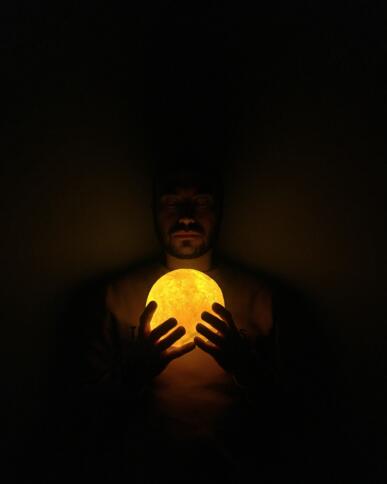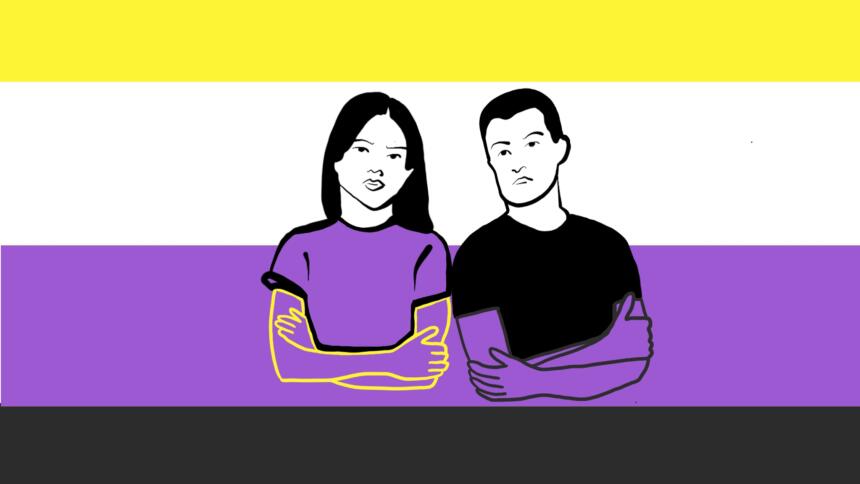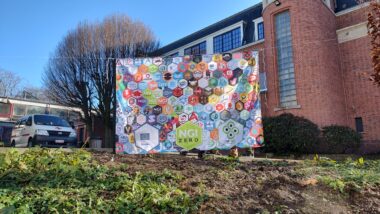Damoun was sitting with friends in a bar when another woman joined them. Damoun had never met her before. The moment she joined the group, Damoun had the feeling that they would soon be verbally attacked by her. She showed off her new short haircut to everyone at the table. The first microaggression came from her as she looks at Damoun in the middle of the conversation and says that she feels like a toxic man now. A man who can rule the world. She stares at Damoun and repeats these phrases. Damoun is just silent.
A few minutes later, she turns to Damoun again during the conversation, saying, „Let’s ask the only man in the group!“
While Damoun introduced themself to her at the beginning, Damoun explained to her that they want to be addressed in a gender-neutral manner using „they/them/their“ as pronouns. She disregarded their identity and continued to ignore it.
Damoun replies, „How dare you call me a man? Since you came here, I feel that I am being attacked by you. I don’t identify as a man.“ She replies, „Oh, but you look like a man to me!“
Damoun is non-binary and does not see themself in the binary definition of a man or a woman. Damoun previously felt like they were shackled by the male gender they were assigned at birth, and liberation from those pre-defined gender stereotypes was a process that began about two years ago and still continues.
Non-binary people don’t have to look androgynous. A person can look like a woman, can stereotypically look like a man, and still be non-binary. It’s not about how people see that particular person. It’s about how the person sees themself. „So please don’t disrespect my own identity.“ Damoun countered, to which she replies: „Well, you keep saying these things, but the world outside your bubble sees you as a man.“
Until somebody really listens to people like Damoun, this will never change. Anybody could change the perspective and the way to see the world. Damoun was interviewed by netzpolitik and talked about things like narrow stereotypes, the use of non-binary pronouns, discrimination, racism, and activism against it.
Breaking down the stereotypes

Damoun was born in Tehran and has been living outside of Iran for almost ten years. Since then they have lived in Dubai, Cyprus, Istanbul and Paris and worked at times as an English and French teacher. Damoun is currently studying Digital Media Culture at Film University Babelsberg and works at She Said bookstore in Berlin, Germany’s first queer and intersectional feminist bookstore with a focus on BIPoC (black, indigenous and people of color), female and queer authors.
Damoun’s work focuses on breaking down the stereotypical image of refugees and presenting their diverse life experiences, such as the challenges refugees and immigrants face in Germany. Nowadays Damoun tries to work with other refugees for more recognition and equality. They are in Europe from different backgrounds and try to increase the visibility of their concerns through different types of media with art and other sorts of activism. Most of the time, however, the hard work of many refugees goes unnoticed and unrecognized, according to Damoun’s statement, because the mainstream media tend to focus on the stereotypical image of refugees. „We need more visibility for diverse stories to make our concerns heard!“ appeals Damoun.
Activism for liberation
Damoun is on the team of Voices4 Berlin, a collective that advocates for LGBTQIA+ rights, meaning lesbian, gay, bisexual, trans*, queer, intersex, and asexual. The collective is linked to other groups in New York, London and one for underage queer youth. Before the pandemic, Voices4 Berlin mainly met and organized street protests. Since Corona, they have been meeting digitally and also organizing protests online.
One of the many actions in which Damoun participated took place in Spring 2020: a Moroccan Instagram influencer posted about Grindr, a dating app for gay, bisexual and trans* men shortly before the first lockdown in Morocco, urging her followers to create fake profiles to track down gay men in their circle of acquaintances. People took screenshots, posted about the Grindr users, and publicly exposed them. As a result, several young gay men lost their homes as their families kicked them out.
Homosexuality is illegal in Morocco where gay people can be sentenced to imprisonment because of their sexual orientation. The online queer dating apps do exist in Morocco, but in cases where gay people publicly disclose their sexual orientation, imprisonment is the consequence. Voices4 Berlin communicated with the other global collectives and they organized temporary housing and food for some of those affected by the outing incidents.
From micro-aggressions to discrimination
During the interview, Damoun often recalls their discriminatory experiences related to gender stereotypes as well as racism. For example, on days when Damoun wears makeup and looks visibly androgynous, they receive friendlier interactions from white, cisgender women. On the contrary, while having makeup on, Damoun often hears discriminatory comments or insults from cisgender men. Just recently, Damoun described a situation in which three cis men insulted them with the word „faggot“ while they were working at the bookstore. Damoun experiences verbal violence primarily in the outside world – however, this is mainly due to the fact that Damoun’s Instagram profile is already set to private for self-protection in the virtual world.
In a study by the German Youth Institute, researchers interviewed queer, young people and found that internet platforms are, on the one hand, an important part of networking, but on the other, a place where discrimination often takes place. On the one hand, they can appear there „in part more authentically than they can in real life“, but at the same time, almost half reported being insulted and called names.
But Damoun doesn’t take incidents of this kind too much to heart: „These men who attack me don’t feel comfortable in their own skin while suppressing their true identities and desires. So when they see a visibly queer person, such men feel triggered because they are not celebrating their real selves as they see me living my own true colors. They’re jealous of me and that makes me feel like a winner.“
However, when Damoun looks stereotypically masculine, ciswomen behave often prejudiced and disrespectful toward them. For example, women walk past Damoun at a far distance on the sidewalk, or change seats when Damoun sits next to them on the train. Damoun fears that this is due to their darker beard and skin tone, the daily racist prejudices against migrants within a dominantly-white, western society.
„Gender is a colourful spectrum, not two black and white constructs.“
„Gender is a religious and social construct“, continues Damoun. „Take a look at some of the indigenous tribes in the past for example: gender-assigned dress codes and social roles did not exist among them because they did not live under the limited, narrow definitions of our current society’s pre-defined norms and standards.“
Damoun continues to describe that a gender non-conforming person can be from anywhere and everywhere within the gender spectrum. People can be non-binary without any androgynous or physical characteristics. At the same time gender identity is not intertwined with sexual orientation.
Gender-neutral use of language shows respect and requires mindfulness, but how exactly does that work? When talking about more than one person at a time, gender-inclusive language is relatively established. And when talking about one person, the appropriate pronouns are used, but the bar situation Damoun just explained already describes the dilemma. One does not necessarily see the perceived gender of a person in their physical appearance. So in case of doubt, one has to ask politely.
Even though the use of gender-inclusive language is becoming more prevalent, we still regularly receive comments on this topic. Our statement why we use gender-inclusive language is now a year old, but the topic doesn’t seem to grow tired for many readers. The more often this issue is addressed and people are made aware of it, the more likely it is that the still fairly new use of language will become established as quickly as possible. Personal experiences, such as Damoun’s, can create empathy through deeper insights into the topic.
For many centuries, English literature has been using the pronoun „they“ in a gender-neutral form, specifically when an English author would refer to one person without wanting to reveal the gender of the character in the book. Therefore it is a bit less complicated to adapt the use of „they/them/their“ pronouns in the daily use of English language for individuals who identify outside the gender-binary boxes.
When talking about Damoun in English, they would always be mentioned using the gender-neutral „them/them/their“ pronouns. In German, Damoun prefers no pronouns, therefore their name is placed instead of a pronoun.
Damoun speaks not only fluent German and English, but also Persian, French, and some Turkish. Persian and Turkish are gender-neutral languages by default, where gendered pronouns do not exist at all.
„Being non-binary is liberation of the self.“
I asked Damoun what the word non-binary means to them. Their response was full of positive energy: „For me, being non-binary is to embrace ambiguity. To bathe in the freedom of all the ways a body can be. I choose to see my gender as a creature that exists not because of me or for me, rather, it exists through me, by presenting it any way I like, without owing anyone androgyny. Being non-binary is liberation of the self.“





Hey Mascha und die Netzpolitk-Gang,
ich wollte mich nur kurz bei euch bedanken für diesen tollen Artikel!
Ich habe mich soooo sehr gefreut, als ich den Titel gelesen habe und umso mehr über den Inhalt.
Ich finde es super das ihr den Schritt gegangen seit. Auch logisch, dass dieser Bereich nicht wirklich in viele Felder eures Spektrums integriert werden kann, aber für mich ist dieser Artikel soetwas wie ein politisches Statement! Und das ist super wichtig! Und ich werde jedesmal einen klenen Luftsprung machen wenn ihr einen neuen gender-meets-digital-life Artikel schreibt!
Danke!
Liebe Grüße und bleibt gesund!
Yo* (non-binary, männlich gelesen)
Das freut mich sehr, vielen lieben Dank!